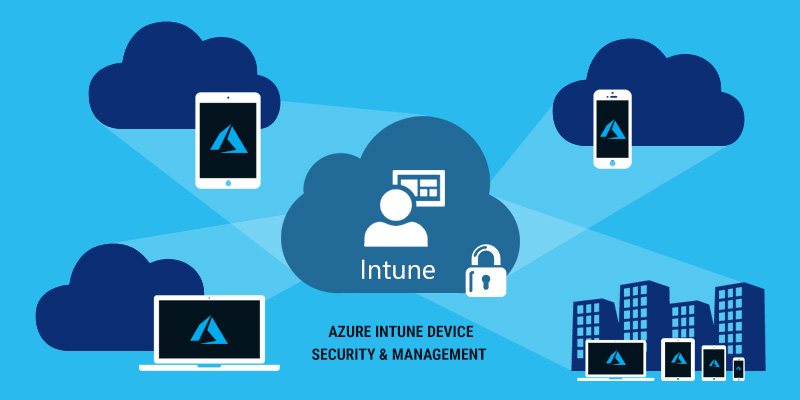15
+
YEARS OF
EXPERIENCE
1000
+
SUCCESSFUL
Projects
80
+
Satisfied
Clients

In the evolving landscape of enterprise IT, securing mobile devices and endpoints is more critical than ever. Microsoft Intune offers a robust solution for managing devices and applications in a unified manner, helping organisations enforce security policies and protect sensitive data. This article explores Intune Security Best Practices, designed to help IT professionals implement efficient and scalable security controls. By following these guidelines, organisations can strengthen their security posture while enabling seamless device management across diverse environments.
Foundations of Intune Security Best Practices: Building a Strong security Baseline
To establish a secure environment using Microsoft Intune, organisations must start by setting a solid security baseline. This involves configuring fundamental controls such as device compliance policies, conditional access, and multi-factor authentication (MFA). Device compliance policies enable administrators to define and enforce rules that devices must meet before gaining access to corporate resources. This can include settings such as encryption requirements, password complexity, and threat protection status.
Conditional Access policies further enhance security by dynamically granting or blocking access based on device compliance, user location, risk levels, and other contextual factors. Leveraging MFA adds an additional verification layer, mitigating risks associated with credential theft or compromised passwords. combining these elements forms the core framework for safeguarding mobile devices in any organisation.
Moreover, frequent monitoring and reporting through Intune’s built-in dashboards allow IT teams to maintain visibility over device status and user activities. Keeping software and device firmware updated via automated patch management policies also reduces vulnerabilities. By taking a holistic approach from the outset, organisations can dramatically reduce attack surfaces and build an adaptive security environment that supports evolving business needs.







Advanced InTune Security best Practices and Implementation Strategies
Once the foundational security measures are in place, organisations should evolve their approach to leverage Intune’s more advanced features for enhanced protection. Role-based access control (RBAC) is essential for limiting administrative privileges and preventing lateral movement within the IT environment. By assigning precise permissions to users and groups, RBAC reduces the risk associated with over-privileged accounts and helps maintain compliance with governance standards.
Another critical best practice is the integration of Intune with Microsoft Defender for Endpoint. This integration enables real-time threat detection and automated remediation on managed devices, creating a seamless security fabric across endpoints. Additionally, adopting app protection policies helps safeguard corporate data within applications without enforcing device-wide management, facilitating a bring-your-own-device (BYOD) model without compromising security.
Data loss prevention (DLP) controls can also be configured through Intune to restrict data sharing, copy-paste functions, and offline access on managed apps. These configurations prevent accidental or malicious data leaks, especially in mobile workforce scenarios. Administrators should leverage dynamic groups in Azure Active Directory to automate device and user categorisation, simplifying policy deployment and updates.
However, advanced security introduces potential challenges, such as balancing user experience with stringent controls and managing policy conflicts. It is vital to test and iterate policies in a staged environment before full deployment. Continuous training and communication with employees ensure they understand security measures and their importance, fostering a culture of compliance that complements technical solutions.

Implementing advanced Intune security features addresses evolving threats while maintaining operational agility. these best practices promote efficiency through automation, reduce attack vectors via granular control, and enable proactive threat management. Together, they empower organisations to protect valuable assets across all device platforms and usage scenarios.
Real-World Examples of InTune Security Best Practices in Action
Triumphant implementation of InTune Security Best Practices can be illustrated through case studies demonstrating tangible business benefits. Consider a multinational enterprise that adopted Intune to consolidate device management and improve security compliance across multiple regions. By enforcing strict compliance policies and integrating conditional access with Azure AD, the organisation reduced unauthorized access incidents by over 60% within the first six months.
Another example involves a healthcare provider that utilised Intune’s app protection policies to safeguard patient data on personal devices used by clinicians. This approach balanced usability with security, enabling secure access to electronic health records (EHR) while preventing data leakage through restricted file sharing and offline caching controls. The provider also implemented RBAC to streamline IT management and reduce operational overhead.
Proxar IT Consulting worked closely with clients to tailor these best practices according to specific business scenarios and compliance requirements such as GDPR and HIPAA. Our expertise ensured seamless policy deployment and integration with existing Microsoft 365 security tools. By sharing these case studies, organisations can gain insights into practical challenges and solutions for robust device security.
These examples underscore the importance of aligning security protocols with organisational objectives and user needs. Intune is not a one-size-fits-all solution; it’s true power is unlocked when configured thoughtfully and supported with ongoing monitoring and user education.

answer time
satisfaction
score
on initial call
same business
day
Strengthening Your Cybersecurity strategy with Intune Expertise
Intune Security Best Practices provide a extensive framework to secure modern enterprise environments built on mobile-first and cloud-first principles. By combining foundational controls with advanced configurations and real-world customization, organisations can mitigate risks associated with diverse endpoints and remote workforces.
Proxar IT Consulting specialises in guiding businesses through secure Intune deployments tailored to their unique infrastructure and compliance landscapes. Our consultative approach ensures that security policies not only protect assets but also enhance productivity by reducing friction for end-users. We recommend starting with a thorough assessment of existing security postures, followed by a phased implementation plan that includes pilot testing, user training, and ongoing support.
Investing in robust mobile device management with Intune is no longer optional - it is critical to defend against increasingly sophisticated cyber threats and regulatory expectations. Ready to elevate your organisation’s security? Connect with us today at contact us to discuss how Proxar IT can help you implement Intune Security Best Practices effectively and efficiently.
Implementing these best practices marks a decisive step towards a resilient and future-proof IT environment, where comprehensive security and operational agility coexist seamlessly.

